The post The Write Stuff appeared first on LiisBeth.
]]>
Lindy Ledohowski was on a conference call when an “angel investor” started screaming at her. He was furious because she had declined his offer to buy stock in her company, Essay Jack, after she realized she had enough friends and family eager to invest in her company.
“It was absolutely insane,” the CEO recalls during our Zoom interview, using her hands to animate the wild story. “Shouting is not a way that I would ever invite you to invest in this business.” She characterized him as a tech “dude” so “ full of his own self-importance,” he thinks budding entrepreneurs such as Ledohowski should be groveling for their support.
This incident earned her a reputation for being “prickly” in her business relations, although her cheery attitude recounting the incident makes it hard to believe. Clearly, she has no problem with that label, even embraces it as a woman navigating the fiercely male-dominated start-up tech industry.
“One of the great things about turning 40 is that you care less about those things,” she says. “I know that the people I care about, my friends and family, if they decide that they don’t like me or I’ve done something wrong, I’ll take that very seriously. But you know, strangers or randos, I don’t care.”
It surely helps that Essay Jack has caught the attention of edu-tech investors and won a bushel of accolades and awards. The software program she helped develop provides tips, tools and video resources for writing essays. She came up with the idea after spending years as a university professor teaching students who were incredibly intelligent, but struggled writing essays. “Essay Jack provides that structure so that you can start writing,” she says, “writing faster and with greater confidence, and going from ‘I have lots of ideas’ to now ‘I’m refining and spell checking my ideas.’”
Instilling greater confidence is a key component, according to Ledohowski. “There is a crisis, especially at the higher education level, with confidence, anxiety, feelings of inadequacy.” She says the program can reduce that suffering by offering tips and techniques so students feel encouraged and empowered to write faster and better.
The application can help any student improve academic writing, but is especially useful as a remedial tool, for those who did not grow up studying in English and last-minute starters as the program provides 24/7 support.
Her company, which launched in 2015, had 12,000 users in 2018 and more than doubled to 30,000 this past spring. During the pandemic lockdown, from March through May, as universities and colleges went online, usage soared by 50 percent, with users around the globe and B2B distributors in Australia, Asia and Canada. And the ceiling is still far off.
Individuals pay $9.99 a month for the service or $99 a year, while bulk buyers such as institutions can lower the per-person fee. The typical user is a keen university student who is willing to put in the work to improve writing skills. Ledohowski says that while the platform is gender-neutral, based on anecdotal data, there are more female users than male. And buyers are more often mothers, who are key decision makers in their children’s education.
The company also skews female, with all the senior positions occupied by women. “When you have a large number of women decision-makers working together, there is a great degree of generosity, collaboration, and a can-do attitude—not just about gender things, but about diversity as a whole,” says Ledohoski.
She and her husband, Rueban Balasubramaniam, a tenured law professor at Carleton University, each own 40.5 per cent of the company with family and friend investors holding the rest. She says her husband doesn’t have an executive role at the moment, but supports her through high-level strategic discussions.
Their most exciting project at hand is a new partnership with the Ogemawahj Tribal Council, to digitize learning and retention resources for teaching standardized Anishinaabemowin languages in Ontario, with the council retaining ownership of the content.
This new project is one of the many indicators that Essay Jack is growing beyond its initial writing platform, with the potential to support and expand diverse initiatives. Ledohoski expects an upcoming rebranding will include a change in the company name to reflect that. “Essay Jack the name, we’ve kind of outgrown it. A super-duper-writing-platform of awesomeness is kind of what we are now.”
This would be the third name for the company, after starting as Essay Hack—marketing the software as an easy way to improve your writing and “hack” your way into an A+. Conversations with investors and schools prompted that name change.
Growing up, Ledohoski never imagined a life as an entrepreneur though she had an example in her father, who left his position as an economics professor to start a hotel business in Manitoba. Her sister and brother currently run and own the family business, but Ledohowski was determined to carve her own path, aspiring to a life in literature.
She obtained a BA in English from the University of Manitoba in 2000, taught high school for two years, added an MA and PhD in English at University of Toronto by 2008 and, after a post doc then a stint teaching at University of Waterloo, returned to University of Toronto as a tenure-track professor.
In her 20s, she says her self-worth was wrapped around academic success. With each new degree feeling like another pat on the head, she found that entrepreneurship helped bring her sense of self-worth back into her own hands.
And that journey has been “gratifying and exciting.” She once thought the reach of her professional career was limited to students in her classes. But Essay Jack has enabled her to help countless students.
“It’s endless how many people can learn to have power over the written word, and then achieve their own goals. There’s this skill set that I’ve been able to develop and translate into software that can now touch millions of people.”
Publishers Note: Essay Jack is a participant in Canada’s first feminist accelerator program for womxn in digital media, Fifth Wave Labs. The Fifth Wave is a year-round program offered by CFC Media Lab and its partners to support the growth and development of women entrepreneurs in the digital media sector in southern Ontario. All enterprise founders in the Fifth Wave community are selected for both their potential and commitment toward weaving intersectional feminist ideals of equity and fairness into sustainable and scalable business growth strategies. Fifth Wave Initiative is committed to 30% participation by members of underrepresented groups. The Fifth Wave is a LiisBeth Media partner.
LiisBeth Media is a 100% womxn-owned and led, reader supported media enterprise. If you enjoyed this story and would like to see more, please consider becoming a donor subscriber today!
[direct-stripe value=”ds1577108717283″]
Related articles
https://www.liisbeth.com/2019/04/26/where-are-the-women-in-canadas-women-in-tech-venture-fund/
https://www.liisbeth.com/2019/11/26/homelessness-theres-an-app-for-that/
https://www.liisbeth.com/2020/02/25/how-to-be-in-the-right-authentic-relationship-with-entrepreneurship/
The post The Write Stuff appeared first on LiisBeth.
]]>The post Feminist Enterprise Commons Launches! Looking for Members and Feminists in Residence appeared first on LiisBeth.
]]>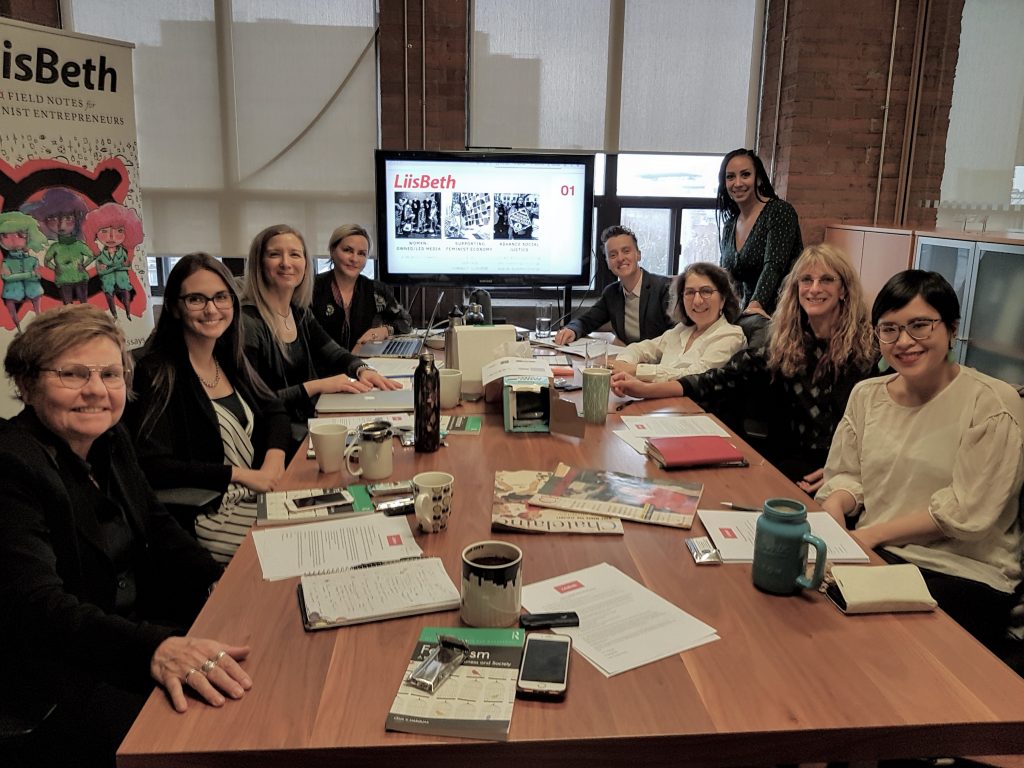
The $1 billion+ fragmented feminist economy comprised of feminist enterprises operating in all sectors to advance equity and equality for women, girls, trans, and queer folk is about to come together.
On January 5, LiisBeth Media, Canada’s only feminist business media enterprise with 2,500 subscribers and more than 19,000 online readers, is launching a new service, the Feminist Enterprise Commons (FEC), an online community built with Mighty Networks technology. It will enable the currently far-flung and splintered feminist enterprise community to come together in a safe, supportive, authentic, radical, change-led, and feminist-values-led space.
As part of the community, members will be able to connect, share valuable insights, ask important questions without outside surveillance, contribute tools, find relevant and new feminist research, and glean new insights to advance their own feminist practice, enterprise, and drive for systems change. They also have the opportunity to work collectively to further strengthen the feminist economy by resourcing, and sourcing from each other.
LiisBeth founder, PK Mutch, says, “We decided to build a new online community because we are increasingly unhappy with policies, bias, and breaches of trust by social network companies like Facebook and Google. Recently, Facebook randomly prevented LiisBeth from posting because they said our group site was too political. Apparently you can’t boost or promote a post about feminism’s point of view on current events without giving them your personal SIN number or driver’s licence. We challenged them on it, and the restriction was lifted—briefly. Still, that was the last straw for me. Once our new network gets going, we will be essentially using our LiisBeth Facebook channel to redirect people to a safer, online space.”
Mutch also adds, “We also aim to keep the community small and engaged. We are not aiming for thousands of phantom users.”
What is a feminist enterprise?
Feminist enterprises are typically founded by visionary feminist entrepreneurs, innovators, creators, investors, researchers, and social justice activists who leverage their entrepreneurial, leadership, innovation capacity, and creative skills expressly to not only create enterprises or projects that advance gender, economic, social, political, and environmental justice, but also to experiment with new ideas that can help us begin to conceive an alternative world beyond neo-liberal capitalism and patriarchy where all people and the planet can flourish.
At present there are no other feminist economy or enterprise-oriented networks in existence. Although, there are an increasing number of feminist business coaches popping up in the US.
PK Mutch explains, “Entrepreneurship is a tough path for all who pursue it to surviving or thriving economically in an increasingly unequal, precarious economy. Heavily promoted corporate responsibility efforts to address broken systems give the illusion that we are making sustainable progress, but the truth is lasting change won’t happen without the engagement of the rest of the economy—entrepreneurs and small enterprise leaders—in a conversation about what an economy beyond modern capitalism and patriarchy might look like.
Feminist entrepreneurs have all that to contend with plus the fact their ideas are marginalized because they challenge deeply held beliefs, and because, often, they move at the speed of humanity—versus the speed of technology.
Mutch adds “The feminist economy has been around for over 100 years (think bookstores and women-led credit unions in the 1970s), yet its work and leaders are systemically and frustratingly overlooked or appropriated without attribution. Most enterprises are grassroots in scale and strapped for time and resources, so finding each other and connecting has been difficult. We saw an opportunity to change that. Ultimately, we believe a stronger, more visible and better supported feminist economy leads to more well-supported experiments with alternative economic models and systems concepts. These tens of thousands of small but bright bonfires for real change will lead to the kind of radical social and economic changes we need to see if we are to ever leapfrog past our currently repressed ideas about the kind of world we have the power to make.”
Canada has a feminist government, feminist budget, and feminist foreign policy—and the Ministry for Women and Gender Equality (WAGE) in 2019 announced the historic $400 million Equality Fund, which combines international feminist grant-making with an innovative investment arm, delivering new momentum for women’s movements and supporting the advancement of gender equality globally. It makes sense that Canada should also be home to the world’s first visionary feminist enterprise community.
Mutch and her team envision that the FEC is intended to become a global community over time.
The Feminist Enterprise Commons
Built on the Mighty Network platform (founded and led by Gina Bianchini), FEC is a space where founders, project leaders, and aspirants can freely ask questions and, with the help of others, refine their ideas about how to flourish differently without fear. A core feature of the community will be the “Feminists in Residence” program. The program will bring in feminist thought leaders who are experts at specific topics and tools like “feminist marketing” or “feminist business model canvas” to share their expertise and will offer exclusive member-only workshops.

Investors, funders, and individuals or organizations with resources to share are also encouraged to sign up and support inspiring founders and transformative ideas that they believe in.
“So many corporations and impact investors are working to support gender equity these days but end up creating their own initiatives to do so instead of finding and investing in feminist enterprises or organizations that are already out there doing this work. The Feminist Enterprise Commons would create an opportunity for them to go to one place to find existing, experienced investees or partners instead of spending time reinventing the wheel,” says Vicki Saunders, founder of SheEO.
Elize Shirdel, a feminist tech entrepreneur, says, “When one decides to create a feminist enterprise, it’s easy to feel alone out in the world. Feminist enterprise communities are cross sectoral, grassroots in scale, fragmented, and widely dispersed. Access to aligned startup and growth funding for promising but radical ideas is extraordinarily difficult. This keeps our voices small and weakens our ability to thrive while doing countervailing work.”
Valerie Fox, founder of the Pivotal Point and a LiisBeth advisory board member, says, “I believe in the power of well-connected innovation ecosystems to change the world. So I am excited about this idea. We need feminist enterprises to lead the way if what we want is the ability to imagine what else is possible socially, politically, and economically. It’s especially important to flow investment towards these sometimes ‘hard to love’ enterprises because they work hard to deeply challenge our assumptions about a system that, frankly, works well for some people, but not all.”
Nancy Wilson, founder of the Canadian Women’s Chamber of Commerce, says, “The Feminist Enterprise Commons is a great idea. It seeks to connect unique types of enterprises and leaders with a feminist point of view. Not all women are feminists and not all feminists are women. If they are successful, they will not only be able to strengthen themselves, but also increase their ability to attract resources and influence policy.”
Mutch adds, “This is not a women’s empowerment or women’s booster network. It is an intersectional, queer and trans-inclusive, pro-reproductive rights, and social equity-oriented feminist space where existing systems are critiqued, dismantled, and new status-quo-busting novel concepts and ideas are worked out.”
The Commons is operated by LiisBeth Media, a division of Eve-volution Inc., a for-profit social enterprise and certified B Corporation. However, LiisBeth Media will be spun off into an independent cooperative by June 2020.
Commons host PK Mutch says, “It goes without saying that the leadership, ownership, governance structure, and community conduct agreements will be ultra transparent, developed participatively, accessible, responsive, caring, inclusive, in other words, feminist in every way. We are very clear that we are not going to build another ‘ghost town’ community network enterprise where frankly, the members in the end, are the product, versus the other way around.”
Mutch adds, “We won’t be perfect, but we will be human. We will work through any stumbling blocks along the way together.”
Creating researched and inspirational content to support and advocate for feminist changemaking takes hundreds of hours each month. If you find value and nourishment here, please consider becoming a donor subscriber or patron at a level of your choosing. Priced between a cup of coffee or one take out salad per month.
Support LiisBeth
The post Feminist Enterprise Commons Launches! Looking for Members and Feminists in Residence appeared first on LiisBeth.
]]>The post Time's Up Tech appeared first on LiisBeth.
]]>
There’s a new form of domestic abuse, and so-called “smart” home devices are the weapons.
And, yes, women are more likely to be affected by this perverse use of technology. Here’s how it works: An abuser can lock a victim into her own home using web-enabled locks, and monitor her every move via video security systems. An abuser can expose a victim to extreme heat or cold by remotely controlling a smart thermostat, or wake her up in the middle of the night by blasting music with a remote control.
Smart home abuse is just one way in which technology is disproportionately harmful to women. A few others: Machine learning algorithms can reinforce gender biases inherent in the datasets used to train them, so recruiting tools for tech workers can be biased against women. Crash dummies are based on male bodies, so car safety tests don’t account for female anatomy. Voice recognition software is more likely to understand a male voice. Mapping apps can provide the fastest route to any destination, though not the safest one. And tech gadgets at our service often have female voices, reinforcing gender power imbalances.
Tech’s dark side arises from who designs and builds it—and who’s excluded from the process. When diverse voices are shut out, so too are diverse ideas, perspectives, and values.
According to a 2019 report by Women in Communications and Technology, men in technology outnumber women by a ratio of four to one. Women who manage to break into the sector wield significantly less power. They earn less than their male counterparts and are less likely to be promoted to leadership positions. Little wonder they’re more likely to flee the industry.
The need to include diverse voices in the innovation process propelled Sarah Saska to found Feminuity, a consulting firm that helps tech companies become more diverse and inclusive. Though her firm’s name blends the words “feminism” and “ingenuity,” Saska wants to do more than just get more women hired at tech workplaces.

Feminuity’s version of feminism is decidedly intersectional. When clients come to Saska saying, “We need to hire more women,” the 30-something entrepreneur takes the conversation deeper. “The goal of 50 percent representation of women in any space is not only shortsighted but also wildly essentialist. You could end up hiring only white, cisgender, heterosexual, able-bodied, resourced women. It’s such a limited frame, and we’ll be no further ahead.”
Rather, an intersectional approach takes into account people’s overlapping identities and experiences. For example, black women, disabled women, gender non-conforming people, and women who care for children and elders may face specific obstacles to employment and promotion. Until a company removes those barriers, it will not achieve equity.
It’s an approach that’s been missing from tech workplaces, says Saska, who grew up in a feminist home and earned a PhD in gender studies and feminist research at Western University in London, Ont. While researching innovation theory for her degree, she began to realize a huge gap. “There wasn’t anything related to humanness, such as gender or race,” she says. “It was absent. It didn’t make sense to me. How could we not talk about the human side of things?”
Wanting to apply her understanding to the business world, Saska launched Feminuity in 2014, along with innovation expert Andrea Rowe (who has since left the company). A 2016 Studio Y fellowship at MaRS Discovery District helped Saska hone her entrepreneurship and leadership skills, build networks, and translate her academic knowledge into business practices.
Says Saska: “I got into this space because, right now, we’re at an inflection point. Some tech companies are larger than entire countries. Tech companies have power, and they’re outpacing our laws and policies and playing in new and grey spaces. Tech can exacerbate or make things better when it comes to equity.”
In Canada’s tech sector, she says the need for diversity and inclusion work is especially urgent. To her knowledge, the massively successful e-commerce platform Shopify is the only tech company with a senior level diversity leader and a team, while the US has many more companies investing in this area. “Canadian tech talks a lot about how ‘diversity is our strength,’ and I find that frustrating,” says Saska. “Diversity is not a given. It’s something that we must design for deliberately and intentionally. There’s a lot that needs to happen before we can say diversity is really our strength.”
Now in its fifth year, Feminuity employs between 10 and 20 people at any given time, contracting specialists as needed to work primarily with small and medium-sized companies that may not have the resources to hire a full-time employee dedicated to diversity and inclusion, yet know they need help.
The process starts when Feminuity conducts a holistic survey of the business, collecting quantitative and qualitative data about processes, physical space, products, and policies.
The quantitative data is decidedly intersectional, with survey questions designed to create a layered picture of how women with multiple identities experience the workplace, helping leaders understand, say, the challenges of a racialized single mother with child care issues.
To gather qualitative information, Anisha Phillips, an associate consultant at Feminuity, conducts video interviews with employees who opt in. Phillips says participants sometimes assume they’ll be asked if they’ve experienced discrimination. Rather, open-ended questions prompt them to describe what they like and don’t like about their workplaces.
“Inclusion has many different aspects,” explains Phillips, adding it doesn’t always look the way people expect it to. In training workshops, the Feminuity team refers to an article that describes 34 diversity characteristics, including gender, sexual orientation, race, religion, language, physical ability, cognitive ability, mental health, social roles within the home, and political beliefs, to name just a few.
After Saska’s team gathers data and analyzes it through an intersectional lens, they co-design strategies with clients, help build an internal steering committee, provide resources and training, and prepare the company to implement the plan, which typically takes six months to a year, though some engage in the process for several years.
Feminuity’s approach may touch on any aspect of business, not just hiring and human resource policies. It could mean diversifying a company’s supply chain to include Indigenous contractors, for example, or improving how work spaces function for people with disabilities, or closing salary gaps that may exist between a company’s most junior and senior employees.
In some cases, Saska may act as a part-time chief diversity officer, a more affordable way to build inclusion into leadership for companies that don’t have the resources to hire a full-time employee for the role. But her ultimate goal is to build internal capacity to embed diversity and inclusion practices in a company’s day-to-day culture and operations.
The key to embedding equity lies in helping leaders see the business through a lens of “futurism,” which, to Saska, means being thoughtful about the long-term impacts of a product or service for everyone—not just the dominant group.
“Is there a chance it could exacerbate inequities that already exist?” she asks. “If your goal is shortsighted, if you just want to get wealthy, there’s always a shadow side. You’re going to benefit some people—those who have dominant identities, those with power—and you’re going to leave others behind.”
Saska sees more tech startups and scaleups baking social justice into their way of doing business from the very beginning. It doesn’t take a lot of resources, she says, but does take a sense of intention. Small startups on small budgets can access Feminuity’s open-source resources—offered free on its website—to create inclusive job descriptions, interview practices, benefits packages, organizational structures, sexual harassment policies, and compensation packages.
Embracing diversity can avoid expensive and complex problems down the road. Saska cites Uber as an example of how failing to consider the needs of women can create a flawed business model, as the money-losing company is plagued by accusations that the car-sharing app makes users vulnerable to sexual assault by contract drivers.
As for Feminuity’s internal hiring process, Phillips described it as “a conversation” rather than about credentials or degrees. She says Saska wanted to know, what her research was about, what types of issues were of interest to her. “It was about getting to know me as a person,” she says.
Saska describes the company culture as being in a continual process of growth. The team is moving to a new space in Toronto and hiring new team members, some of whom will work remotely. That has spurred her to study inclusive practices for remote teams, which she’ll test on her own group.
“We are trying to figure out, embody, and actualize the work we do with our clients,” says Saska. The goal is to distill social justice concepts into habits of thought for groups who create technologies, and that’s an ongoing project.
Creating researched and inspirational content to support and advocate for feminist changemaking takes hundreds of hours each month. If you find value and nourishment here, please consider becoming a donor subscriber or patron at a level of your choosing. Priced between a cup of coffee or one take out salad per month.
Support LiisBeth

This article was generously sponsored by Startup Toronto!
Related Articles
https://www.liisbeth.com/2019/04/26/where-are-the-women-in-canadas-women-in-tech-venture-fund/
The post Time's Up Tech appeared first on LiisBeth.
]]>The post Homelessness: There’s An App For That appeared first on LiisBeth.
]]> CG Chen, founder of Ample Labs (Photo: David Dines)
CG Chen, founder of Ample Labs (Photo: David Dines)
Working as a user experience designer at a tech company, CG Chen had done co-design workshops before, but this one was different. Around a dozen young people crowded into a small room at Sherbourne Health Centre in downtown Toronto, to share their experiences with homelessness. They appeared to be between 16 and 30, identified as LGBTQ2IA, and participated in the health centre’s Supporting Our Youth (SOY) program that promotes wellness for at-risk youth. That day, they didn’t come seeking support, but to lend a hand—and to share their experiences so that Chen’s non-profit startup, Ample Labs, could improve an app to access services for the homeless.
Creating a trusting atmosphere for the youth living on the street took conscious effort. Chen met with SOY staff multiple times in advance to ensure the workshop was a safe space, anti-racist, and anti-oppressive. Then Chen got creative, handing out writing and craft supplies to those gathered around a large table, so they could express themselves authentically and on their terms.
They came from different backgrounds—some had lived in Canada for years, others had recently arrived as refugees—but they all shared a key concern when looking for a place to spend the night: safety. The participants told horror stories of ending up in shelters that weren’t LGBTQ2A friendly—and experiencing violence and trauma as a result.
During this co-design session and many others, Chen and her team of volunteers at Amble Labs also discovered that many initially facing homelessness turned to Google for help as they were often too ashamed to seek out in-person resources. But the Google results that came up were not very helpful. That was one of the main frustrations people in the sessions expressed—service agencies don’t actually involve or listen to the concerns of individuals experiencing homelessness.
Says Chen of Ample Labs’ venture to change that: “We bring the people that we build this product for into our process as much as possible so they’re part of building the solution with us.”
The result? Chen and her team learned that Toronto’s homeless population has high concentrations of people identifying as refugees, BIPOC (Black, Indigenous, and people of colour), and/or LGBTQI2A (particularly youth). So Ample Labs decided to focus on creating solutions for individuals between the ages of 16 and 35 who are at risk of or experiencing homelessness and come from diverse identities and situations. One of their first creations was ChalmersBot, a free web-based chat-bot that provides location-based information. You enter what you need—a warm meal, clothing, shelter—and ChalmersBot suggests a nearby resource. After what they learned at the SOY workshop, Chen and her team added a filter to ChalmersBot to identify resources that are LGBTQI2A friendly.
Chen describes working intentionally and directly in a co-design fashion with the homeless community as a feminist approach. The goal is to understand what the homeless need and empower them to contribute to solutions, so services created are actually used by the community. “It’s easy to identify as a feminist organization because with the app and in everything we do, we are trying to promote equality in this community that often times struggles with inequality.”
Could a Sandwich Start a Revolution?
Chen, now 27, can trace the start of her journey to a sandwich. While studying graphic design at the Ontario College of Art and Design (OCAD), she had to pass by people living on the streets of downtown Toronto—and eventually found she could no longer look away. So Chen gathered some friends and started distributing food to the homeless.
A sandwich often led to conversation—and a new perspective. “I think a lot of us really wanted to understand how people ended up there, what they are like. Who I thought the homeless were was turned upside down because I met previous entrepreneurs and really wealthy people who, through a series of unfortunate events, ended up on the streets.” For instance, a highly educated doctor who wound up homeless after going through a rough divorce.
Chen started seeing homelessness in a new light—a difficult situation that can happen to people of all backgrounds. That realization hit home in 2019 when Chen’s own mother experienced homelessness after a surgery made it difficult for her to find work. “If it was your family, how would you look at things? How would you treat that person you see on the street if she was your mom?” Chen asked in a blog post.
For her undergrad thesis, Chen explored how to use design and technology to help the homeless, redesigning a list of City of Toronto resources into a user-friendly website. She took a tech job after graduation, but a trip to Los Angeles reignited her passion for helping people struggling with homelessness. During a visit to LA’s notorious Skid Row, an area of downtown with a high concentration of homeless individuals, she met a woman teaching computer skills, such as how to craft a resume, to people on the street. What struck Chen? While residents of Skid Row lacked a permanent home, they often had cellphones or access to technology. (In a survey of 421 homeless individuals, 94 percent of respondents said they owned a phone and used it as an essential tool for communication.)
That trip helped Chen envision an opportunity to combine her skills in tech and her passion for helping the homeless. As she had done with her sandwich runs, Chen gathered a group of friends to reach out to the homeless community in Toronto and learn more about their needs.
Simon Bunyi was part of the Ample Labs team when he found himself in the same situation as people they were trying to help. He was laid off from a Fortune 500 company and later evicted from his apartment; this is statistically the most common reason individuals end up homeless in Toronto. Those were his “darkest days,” he says, looking back. “It made me think more about how I interact with people.”
Bunyi had been living in an area of Toronto with a high concentration of people living on the street. He came to realize that the only thing separating himself from them was a regular paycheque. When that disappeared, Bunyi reached out to Chen and Ample Labs to help him navigate the complex network of websites and resources for help. They thought it would be simpler if there were an app for this. And that was the beginning of ChalmersBot. (Watch the full story below.)
So, More Apps for That?
Chen never intended Ample Labs to be more than a side project, but after the beta launch in November 2018, the team of 20 to 30 volunteers realized the service had tremendous potential to help the estimated 235,000 Canadians who will experience homelessness. In the past, that population largely comprised of older, single men, but according to the study, Canada has seen a rise of women and youth ending up on the street. With its ability to tailor resources to specific demographics, ChalmersBot generated attention. Ample Labs raised money from a crowdfunding campaign, grants and corporate sponsors (including TD, Google, and Twitter) and found a home in Ryerson University’s Social Venture Zone. The goal is to generate additional, sustaining revenue selling ChalmersBot services to cities. Barrie, Ont., was the first to buy in. Numerous other cities in Canada and the US have shown interest.
Ample Labs now has 8,000 unique users in Toronto and multiple contractors, prompting Chen to quit her job as a UX designer and become Ample Labs’ first full-time employee. She’s recently hired a second employee and plans to continue expanding the team in 2020. Though the non-profit is experiencing exciting and rapid growth, the culture and core values of Ample Labs remain the same.
“Internally, we’ve built a culture of always learning from each other and making sure it’s diverse voices that are teaching the rest of us,” says Chen. “We want to build something with people, not for people.”
Creating researched and inspirational content to support and advocate for feminist changemaking takes hundreds of hours each month. If you find value and nourishment here, please consider becoming a donor subscriber or patron at a level of your choosing. Priced between a cup of coffee or one take out salad per month.
Support LiisBeth
This article was made possible thanks to the generosity of Startup Toronto.
Related Reading
https://www.liisbeth.com/2019/03/09/move-over-girlboss-its-the-feministboss-era/
https://www.liisbeth.com/2019/04/26/where-are-the-women-in-canadas-women-in-tech-venture-fund/
The post Homelessness: There’s An App For That appeared first on LiisBeth.
]]>The post Righting Who Writes Code appeared first on LiisBeth.
]]> Takara Small, founder of VentureKids Canada
Takara Small, founder of VentureKids Canada
Takara Small is good at many things, but perhaps her greatest strength is being able to compartmentalize microaggressions so she can go on about her day. As someone who runs a non-profit, writes about technology, appears on radio and TV, and hosts two podcasts, she has little time to ruminate on the racism and sexism she encounters.
For instance, at a recent tech conference that she was covering for a leading publication, she was asked odd questions. Where is the bathroom? What floor is the event on? “I was so confused,” says Small. “Then I realized they thought I was staff because the only Black people at the conference were staff workers. They assumed anyone who was Black was not media or not a speaker.”
As a form of self-preservation, she adopts a “forgive but never forget” mantra and channels her energy into creating opportunities for others facing barriers in tech and STEM education.
In 2017, Small, 31, started VentureKids Canada, which brings free coding, financial literacy, product building, and entrepreneurship workshops to young people from low-income and underserved communities in urban and rural Ontario.
VentureKids turns common barriers into non-issues. Can’t afford a coding class? It’s free. Don’t have a laptop? They’ll provide you with one. Couldn’t pack a healthy lunch? Food is taken care of. Worried you’ll be the only girl? Classes are gender-balanced. The non-profit has even given students face time with big tech reps from Microsoft, LinkedIn, Google, and Twitter—an encounter that’s super rare if you’re a teenager from rural Ontario.
Says Small: “There’s a misconception that everyone owns a laptop and has access to the internet. That’s not true. In Canada the cost of data is quite high, and the cost of laptops and phones can be prohibitive for some people. I wanted to make sure I was creating free programs that would help people from financially sensitive backgrounds be able to work in an industry that desperately needs workers.”
Desperate is right. Tech leaders have been going on and on about how they want to attract more diverse talent. The research has made it abundantly clear that a diverse workforce leads to more open-mindedness and innovative ideas. According to studies, it’s also just plain profitable. Still, women, Indigenous peoples, some racialized minorities, and LGBTQ+ workers are less likely to be included in the tech economy compared to men and non-racialized workers. Even if they’re in, they don’t always feel included.
Bias is to blame for the lack of diversity, but so is a leaky educational pipeline that limits some people’s exposure to computer science careers at an early age. With VentureKids, Small is determined to patch up parts of that pipeline by showing marginalized kids that they too can be entrepreneurs and tech workers. Often, she’s one of the only people to show them these possibilities.
Paying It Forward
When LiisBeth’s editor put out a call for pitches about Toronto feminist entrepreneurs advancing social justice, Small was the first person I thought of. Full disclosure: She’s a good friend of mine. We met at Ryerson University as journalism students. Even back then, Small was striving to make a difference, and this made her very, very busy. Now, on top of running her non-profit (she does not pay herself for this work), she hosts two podcasts: I’ll Go First for The Globe and Mail, and Dial Moving for #MoveTheDial where she talks to leaders about all the things that affect underrepresented groups in tech. She also makes her living as a public speaker and journalist for various media outlets including the CBC, The Globe and Mail, and Refinery29.
Small’s upbringing informs much of the work she does today. She was raised by a single mother in Toronto before they moved to Cobourg, Ont. Thanks to a combination of scholarships and financial aid, she was able to move back to Toronto to attend university and eventually break into the tech and media sector. Her journey hasn’t been easy, which makes her more determined to ease the path for the next generation of marginalized folks. “Not everyone can afford to go to college or university. If I really wanted to make a difference, I knew I had to start VentureKids for the kids and families who don’t have the means to pay for coding programs,” says Small.
This past summer, VentureKids launched its first rural-city program thanks to some sweet partnerships with Northeastern University Toronto, Microsoft Canada, the Town of Cobourg, and loyalty program company Points, along with individual donations. As a result, VentureKids secured free space, talented mentors, breakfast and lunch, and roundtrip train tickets for 20 students from eastern Ontario. Every Friday for three months, students aged 14 to 18 took basic web development classes and brainstormed ways technology could solve a specific problem in their community.
A teenager from a rural farm came up with the idea to start an equipment-sharing website where farmers could connect with other farmers to share the cost of expensive equipment and maintenance fees. The idea took off. Now, she’s getting interest from clients outside of her farming family.
Small says students developed several other promising ideas and everyone stuck with the program, despite the up to six-hour roundtrip commute in one day (some had to wake up as early as four in the morning). That tells her underserved youth are hungry for this opportunity. Says Small, “Not every student will create a business that gets funding, and not all startups end up lasting, but the fact that we have students interested in thinking about entrepreneurship is a success.”
Looking to the future, one of VentureKids’s goals is to expand its rural-city program to northern Ontario so that it can reach out to Indigenous and new Canadian students.
Raising a Village to Raise Tech Kids
Running a non-profit is hugely time consuming. Consider this recent tweet from Small: “Seriously thinking about changing my bio to simply read ‘tired’ lol.”
Small does a lot of networking, reaching out to volunteers, experienced teachers, and community partners to donate their time, money, space, expertise and even their laptops. Workhaus lends VentureKids a complimentary office space in their downtown Toronto location. Carole Piovesan of INQ Data Law provides free legal help. Says Small, “One thing I have learned is that there are people and allies who are willing to donate their time and services because they care about our mission.”
In the New Year, Small faces the enormous task of putting a volunteer board of directors together. The five directors don’t have to have a tech background per se, but a diverse set of skills and experiences certainly helps.
In the two years since becoming a non-profit founder, Small has learned a few lessons. She’s learned to seek volunteers who are reflective of the people they’re serving and who understand the difficulties of breaking into the tech sector. By contrast, one well-known business leader offering unsolicited advice clearly didn’t get the program when he suggested cutting the free breakfast and diverting the money to other things. Says Small: “That advice doesn’t really match with how we operate. I think it’s well meaning but when you consider the fact that the populations we’re serving don’t have the resources, then it doesn’t really make sense.”
It’s a hard slog, for sure, but Small says the benefit of a non-profit is being able to focus on the communities and youth they serve instead of worrying about making as much money as possible to please investors and shareholders.
“Finding ways to keep yourself optimistic is really important and VentureKids helps with that,” says Small. “It’s a ray of hope and it keeps me excited about the future.”
Recommended Listening
On top of hosting two podcasts, Takara Small listens to a few herself. Here are her faves:
Harvard Business Review: HBR has a variety of podcasts on leaders in business, women in the workplace, and advice on work dilemmas.
Blacticulate: A British podcast featuring interview with young Black professionals.
Oprah Super Soul Conversations: Oprah’s personal selection of interviews with thought-leaders, best-selling authors, spiritual luminaries, as well as health and wellness experts.
Science Vs: This podcast explores fads and trends to find out what’s fact and what’s not.
Did you like this article?
If you appreciated this story, please help us work with women journalists who can write more of these stories for fair pay. You can donate here!
[direct-stripe value=”ds1554685140411″]

This article was made possible due to the generosity of Startup Toronto.
Related Reading
https://www.liisbeth.com/2017/08/28/elevating-inclusion-diversity-toronto-tech-scene/
The post Righting Who Writes Code appeared first on LiisBeth.
]]>The post LIISBETH DISPATCH #52 appeared first on LiisBeth.
]]>
Photo by Stevens Marallana on Unsplash
PK’S VIEWPOINT
WHAT WOULD ROXANE GAY SAY?
We all know media bias exists. Just take a look at how each of these four Canadian mainstream newspapers positioned the dismissal of Jody Wilson-Raybould and Jane Philpott from the Liberal government’s caucus in early April.

Notice the editor’s choice of photos. Check out the headlines. Was it really necessary to shout “Tuesday Night Massacre” on the front page knowing that for some women, those words might have invoked the memory of a tragic event in Canadian history? The Montreal Massacre happened twenty-eight years ago where 14 women were killed by a male shooter at the École Polytechnique in Montreal, Quebec.
Consider the picture of Prime Minister Justin Trudeau on the cover of the Toronto Sun, and the accompanying headline: “Fake Feminist.”
For our readers outside of Canada, all these stories reported on Trudeau’s handling of a local corporate bully (SNC Lavalin, an engineering firm) and its efforts to delay prosecution over its use of public money to pay bribes to governments overseas (illegal in Canada). The situation led to a sizeable “he said/she said” drama between the Prime Minister, his office, and the Office of the Attorney General. The result was the removal of two smart, competent women from the Liberal government’s famous 50/50 caucus.
With great concern for how power influenced process, the nation debated whether or not Trudeau is authentic about his commitment to see women advance in society. Trudeau famously said: “Because it’s 2015” a comment on Canada’s first gender-balanced cabinet, the same man who just expelled two women from caucus.
As the fake feminist/real feminist conversation misted the political newscape of “We the North” land, and even made The New York Times, many of us who identify strongly as feminists, heaved a weary sigh.
In her New York Times Bestseller, Bad Feminist, Roxane Gay writes: “The more I write, the more I put myself out there as a bad feminist…but [at least] I am being open about what I am and who I was and where I have faltered and who I would like to become.” Gay’s book talks about the fact that despite her feminist identity, pink is her favorite colour and she sings along to catchy misogynist hip-hop songs.
Gay compassionately and beautifully makes the point that there is no perfect feminist—and counts herself among one of the most imperfect feminists around. Feminism is a huge, global, social movement. Complex, pluralistic, and hard on those who pick up the gauntlet. Everyone in it is learning. All the time. But rather than give up on the movement’s objectives and demands, Gay concludes her book by saying, “I am a bad feminist. [But] I would rather be a bad feminist than no feminist at all.”
I’m not letting Trudeau and his team off the hook. But as someone who lives in a province (Ontario) with a non-feminist provincial government working to lower the cost of beer, save money by reducing support for mid-wives, women’s shelters, library services, and implementing roll-backs on progressive sex-education, I can safely say that I would prefer a bad feminist government, than no feminist government at all.

THIS WEEK ON LIISBETH

Feminist Initiative leader Gudrun Schyman meets activists in Norway. Photo: Mimika Kirgios
(Gudrun Schyman centre stage wearing glasses)
HOUSE PARTIES RULE
If the Nordic diet ensures a healthier lifestyle, what can Nordic politics do for a more inclusive society? The Feministiskt Initiativ (FI) is a feminist political party founded in Sweden almost 20 years ago. Since then, many other European countries have followed suit.
What about the rest of the world? Few know that Canada once had a feminist party. The Feminist Party of Canada (FCP) was founded by Angela Miles. Women and men joined the party in 1979. The purpose was to “participate in electoral politics while transforming them along feminist lines. The media often included the Feminist Party when seeking statements or public appearances from political parties, which gave the FPC a strong public presence.” The party lasted three years. To learn more about it, click here.
Turns out that 40 years later, we are still struggling with the same issues. Perhaps the lack of a feminist party is part of the reason why.
We need to politicize the question of why feminist parties are needed now more than ever until it becomes OBVIOUS.
When film critic and writer Annika Andersson contacted LiisBeth about her idea to interview Sweden’s FI party founder, Gudrun Schyman, we put the story on our list. You voted yes (LiisBeth December Story Poll) and we commissioned the work.
Andersson flew all the way to Sweden to conduct in person interviews with both Schyman, and incoming leader, Gita Nabavi, to learn how human rights are at the forefront of their mandate and why they’re called the Home Party-party. Read the full story HERE.
Speaking of politics, thank you for voting. This story happened because of YOU. The article won the vote in our first reader poll. You voted, we got to work. #collectiveaction

April 15th: Minister Mary Ng announcing $2.5M investment into SheEO, a Canadian-based, global initiative designed to radically transform the way we finance, support, and celebrate female entrepreneurs. Photo: SheEO Twitter Feed
HOW TO GET INTO POLITICS
News media organization Al Jazeera‘s election tracking website says “Nearly two billion voters in 50 countries around the world will head to the polls [in 2019] to elect their leaders.” Realizing that political power is an effective way to drive change—many women are shaking off fears and running as candidates for the first time. But it’s not an easy job to be a politician. Even harder to become a candidate.
Many of us in the women’s entrepreneurship space in Canada see a lot of the Minister for Small Business and Export Promotiom, Mary Ng.
We thought we would ask Minister Ng about her start in politics. We hope it inspires others to consider the path. See our interview here.

A Nightwood Society panel discussion on the future of food with Michelle Battista, Salt & Straw’s Kim Malek, Alison Wu of Wu Haus, Nong’s Khao Man Gai founder Nong Poonsukwattana, and chef/food activist Arlyn Frank of Platano Rising.
Panel held by Cherry Bombe, a magazine devoted to women in food.
BUTCHERS, BAKERS AND CHANGEMAKERS
Portland, Oregon, USA. Known for coffee, eco-friendly bike paths, Ursula K. Le Guin and the Nightwood Society. From art to food, and crafts to music, this company has reinvented the idea of horizontal growth: doing a bunch of interesting things that complement each other. They’re complex and super cool.
Nightwood Society is a unique collective that is taking collaboration to the next level. Full story here.

Powerbitches founder, Rachel Hills
POWER BITCHES STIRRING THE POT
What’s so different about this feminist community network? For starters, it was founded by Rachel Hills, a feminist writer, producer, and movement-maker whose work has been published in The New York Times, Washington Post, Cosmopolitan, The Guardian, The Atlantic, Vogue, Buzzfeed, The Cut, and many more. Hills is also the author of “The Sex Myth” which was written to help make sense of the feelings of shame and difference she felt about her own sexual history.
Powerbitches is hosting an event focused on feminist entrepreneurship on May 13th. Fearless Entrepreneurial Feminist Forum (EFF) co-founder Lex Schroeder is on the speakers list. But you have to be a member to participate. To learn more about this organization, read our interview with Rachel Hills here.

WHERE ARE THE WOMEN IN TECH?
Innerspace is a tech company that wants to help Google figure out where you are going while inside a building. Apparently Google can tell what building you are in, but can’t see if you are in the bathroom or lunch room or at your desk once inside. A few weeks ago, Innerspace received venture investment from the Business Development Bank of Canada’s (BDC) Women in Technology Fund.
Those close to the company questioned its qualifications as a women-led tech company given there was only one woman on the team in the role of Chief Marketing Officer.
LiisBeth decided to dig in and check out the investments made since the fund started in 2016. You can find the results here. The punchline? The fund has a very low benchmark for what qualifies as a women-led tech company. The good news is that with the will to lead, BDC could change that going forward. An even better idea? Get out of the way and hand the fund’s management over to a collective of women in tech.
Have you had an experience with BDC’s WIT fund? Use the comment box at the bottom of the article to share your story or thoughts.
FEMINIST NEWS FREEBIE!
Grammy award-winner Lucinda Williams and a host of top Canadian and U.S. journalists will mark the Canadian Journalism Foundation’s (CJF) second World News Day on May 2nd in Toronto. Brian Stelter, chief media correspondent for CNN Worldwide and host of Reliable Sources, will emcee.
LiisBeth subscribers are eligible for complimentary tickets here with promo code: NEWSMATTERS
Speakers include: Manisha Krishnan, senior writer and host with VICE on covering weed, opioids and #MeToo, Connie Walker, host of CBC News podcast Missing & Murdered: Finding Cleo, and Julian Brave NoiseCat, journalist, on telling Indigenous stories, Hannah Alper, teenage activist, blogger and author, in conversation with Brian Stelter, and more. See the full list of speakers here.
World News Day takes place on the eve of World Press Freedom Day to celebrate the stories, the people, the reporting and the professional news organizations that are dedicated to changing lives, challenging the status quo, holding those in power to account and supporting freedom and democracy.
LIISBETH FIELD NOTES

Pramila Jayapal / Photo: Fathom Film Group
HUNTING IN PACKS
In the era of Trump and the #Me Too movement, Hunting in Packs is a provocative documentary film about three female politicians in Britain, the United States, and Canada negotiating their way through the old-school institution of politics.
“Things have gotten to the point where the absurdity of it all is beyond reason,” says Toronto based filmmaker Chloe Sosa-Sims. “Political farce has long lived as a genre in narrative film, but it no longer needs to exist in a parallel world of fiction, it’s our reality.”
The documentary follows three different women in three different countries who exist in parallel. They speak on world stages and perform with glowing confidence; they are policy makers, advocates and experts in their fields. Behind-the-scenes, their humanity is exposed as we get face-to-face with the reality of their livelihood; battling it out with less than worthy opponents, facing on-going ridicule when not towing the party-line, and encountering harsh contempt from the public. They are entirely different from one another, but are connected by an invisible thread.
Jess Phillips in the UK receives thousands of rape and death threats a year, largely because of her feminist rhetoric. Worse though, is much of the threats come from within her own party – the Labour party.
In the US, Pramila Jayapal has many radical proposals; sitting on the committee that will consider Trump’s impeachment, calling for Medi-care for all, and demanding reparations be paid to families separated at the border. As always, Republicans will shut her down, but there are some moderate democrats who are afraid that Pramila is too progressive and is creating a counterproductive narrative about Democrats seeking open borders.
Canadian Conservative Michelle Rempel believes the liberals are not properly handling the refugee crisis. On the other hand, she is fighting for more supports for the Yazidi community, especially the women who have been violated by sexual slavery.
“These women stand up for what they believe in and don’t let others, and the patriarchal nature of politics, hold them back,” says Sosa-Sims. “They are all forwarding policies that directly benefit these communities. And they are all driven by their personal commitment to feminism.”
Hunting in Packs is in early stages of production. The film is produced by Fathom Film Group, a women-led production company who doesn’t let the patriarchal nature of filmmaking hold them back.

CanWACH Director, Julie Savard-Shaw at a Mobilization event in Edmonton.
HEALTHY WOMEN, HEALTHY ECONOMY
Investing in girls and women affects the economy and keeping girls and women healthy is paramount.
The Canadian Partnership for Women and Children’s Health (CanWaCH) catalyzes collaboration among 100 partners who are improving women’s and children’s health globally. CanWaCH will be on site June 3rd to 6th in Vancouver at the Canadian Pavillion at the Women Deliver 2019 conference. The three-day event is the world’s largest gathering on gender equality and the health, rights and wellbeing of women and girls. Over 7,000 experts, journalists, activists, world leaders and youth will come to Canada for the conference, including LiisBeth! CanWaCH is using this huge momentum of the event to push for improved leadership on gender equality.
“We want to ensure that Women Deliver 2019 is not just a moment but springboard for action and real change,” says Caitlin Reid, Senior Communications Officer at CanWaCH.
Exactly one year ago they launched a campaign inviting organizations to host an event at the Canadian Pavillion and over 300 organizations signed on to join as “Mobilizers”. “They are all taking concrete actions to improve gender equality,” says Reid.
CanWaCH’s Month of Action starts on May 7th and will run until the conference begins in June. They will call on Mobilizers, and the public, to take final actions right up to the beginning of the conference. Reid says: “It will be the most important time for us to increase our shared impact and attention at the national stage.”
CanWaCH has secured Steamworks brew pub as HQ during the three-day event. Less than a ten-minute walk away from the conference at the Vancouver Convention Centre, the Canada Pavilion will be the go-to location for approximately 49 different events hosted by Canadian organizations between June 2nd to 7th, alongside the Women Deliver Conference.
Themes for the programming will be focused on women and children’s health. Mobilization events will be about achieving gender equality here in Canada and around the world.
Each event will have its own RSVP process and many will be open to the public and some will be live-streamed. Stay tuned for schedule updates coming soon.

Curbside view of Toronto’s oldest feminist bookstop
ANOTHER STORY BOOKSHOP
Toronto-based feminist bookstore, Another Story Bookshop has been operating in the west end of the city for over 30 years. The store sells a broad range of literature for children, young adults, and adults with a focus on themes of social justice, equity, and diversity. It also holds and hosts over 50 events per year. Its May 6th event at Lula Lounge is sold out. The evening will feature feminist crush adrienne maree brown, author of Emergent Strategy and her new book, Pleasure Activism plus other guests like Chanelle Gallant, a long time activist, writer and trainer with a focus on sex and justice.
A few weeks ago, we visited the shop to learn more about how this independent feminist bookstore has managed to thrive in the Amazon.com age.
To listen to our interview with the store’s event planner, Anjula Gogia, CLICK THE LINK at the bottom of the photo below. And if you didn’t get a ticket to the event (tickets were free but you had to sign up), don’t worry, we got you covered. LiisBeth will be conducting a video interview with Brown at the event. We are excited to share the chat with you all in our next refresh!
Want to order Brown’s latest book, or any book? Another Story ships anywhere! To order, and support indie bookstores, click here.

To hear the interview click here.
Photo: Emmy Legge, Customer Service (Left) and Anjula Gogia, Event Planner (Right)
FEMINIST FREEBIE!

JUST FOR SUMMER!
OUR DOWNLOADABLE READING LIST
We have updated our LiisBeth recommended reading list for feminist innovators and entrepreneurs! To download a collectively and carefully curated list of books, articles, and links that are central to the concept of feminist entrepreneurship, click here.

Flowers rely on sun and rain.WE rely on YOU.
Our readers.
Every paid subscription helps us with grant applications.
If social and economic justice are important to you, here’s your chance to
help us grow the feminist economy…like 400 crocuses.
Our impact is measurable.
If you find our content of value, consider contributing to us on Patreon
Each online magazine refresh and newsletter takes a collective effort.
We have reached over 2,500 subscribers.
Less than 30% contribute financially.
LIISBETH STORY VOTE
Seeking: PROFILES of kick ass entrepreneurial feminists.
The City of Toronto contracted LiisBeth for the “Unapologetic: Feminist Founders in the City” (working title)
Hooray! We’ll be doing TEN profiles of feminist entrepreneurs who are changing the way businesses are designed and operated between now and December 2019.
We would LOVE to replicate this series in other cities and towns. But will need an editorial partner. Let us know if you are interested.
If you’re not sure if a business/person/company qualifies, this will help: Does Your Enterprise Meet the Feminist Business Standard?
We’ve got some ideas but we want to hear from YOU. What if we could make this initiative happen in communities around the world?
Send us your pitch HERE. A paragraph about a feminist entrepreneur in your community and why they should be featured.
Last month we asked readers which story we should publish next. We received only a handful of responses. But hey, our view is that it takes time for readers to get to know how this works—and that voting does work. (See Gudrun Schyman story above.)
The winning pitch from last month is: A story of the legacy left behind following the Wakefield, UK miners’ strike which was famously supported by gay and lesbian organizations—and serves as an example of an intersectional movement long before the word was coined. Readers are wondering what Wakefield is like now? Did activism have a lasting impact? We will be contacting the journalist shortly!
WHAT WE’RE READING

Twenty-Three Leading Feminist Writers on Protest and Solidarity
When 53 percent of white women voted for Donald Trump and 94 percent of black women voted for Hillary Clinton, how can women unite in Trump’s America? Nasty Women includes inspiring essays from a diverse group of talented women writers who seek to provide a broad look at how we got here and what we need to do to move forward.
Featuring essays by REBECCA SOLNIT on Trump and his “misogyny army,” CHERYL STRAYED on grappling with the aftermath of Hillary Clinton’s loss, SARAH HEPOLA on resisting the urge to drink after the election, NICOLE CHUNG on family and friends who support Trump, KATHA POLLITT on the state of reproductive rights and what we do next, JILL FILIPOVIC on Trump’s policies and the life of a young woman in West Africa, SAMANTHA IRBY on racism and living as a queer black woman in rural America, RANDA JARRAR on traveling across the country as a queer Muslim American, SARAH HOLLENBECK on Trump’s cruelty toward the disabled, MEREDITH TALUSAN on feminism and the transgender community, and SARAH JAFFE on the labor movement and active and effective resistance, among others.

Jenni Murray gives the lie to Thomas Carlyle’s infamous declaration that ‘the history of the world is but the biography of great men.’ Women have played just as great a role in the story of humankind, only for their own tales to be marginalised, censored and forgotten. Their names should be shouted from the rooftops.
Marie Curie discovered radium and revolutionised medical science. Empress Cixi transformed China. Frida Kahlo turned an unflinching eye on life and death. In A History of the World in 21 Women, Jenni Murray celebrates the lives, struggles and achievements of some of the most extraordinary people to have ever walked the Earth. They ruled empires, they led nations. They were pioneers in the arts and geniuses of science. They led while others followed, spoke truth to power and fought for change. All left behind an indelible mark.
‘Charming…[Murray’s] selection is pleasingly varied… but the strength of the collection lies in Murray’s relaxed and intimate style… a testament to the achievements and the complicated legacies, of extraordinary women.’ (BBC History Magazine)
Recommended by Another Story Bookshop, Toronto, Canada.
AND FINALLY . . . IN CASE YOU MISSED IT!
- Mental health conditions or addictions can get in the way of employment for many. Fortunately, Rise Asset Development, a unique entrepreneur support organization provides training and access to startup loans of up to $10K for aspiring entrepreneurs with mental health challenges. Their seven week youth program for aspiring entrepreneurs starts in July, 2019. If you or someone you know is a Canadian citizen, aged 16-24 and lives in Toronto, sign up today. Sign up here!
- Slovakia voted in its first female president last month. Zuzana Čaputová, a 45-year-old lawyer and anti-corruption campaigner, won 58.4% of the votes in Saturday’s poll and will take office in June. She campaigned on platform of humanism, solidarity and truth. “Let us look for what connects us. Let us promote cooperation above personal interests,” she told a crowd of supporters in Bratislava. The full article is in The Guardian here.
- Naomi Klein’s article in The Intercept includes the seven-minute short film “A Message From the Future” narrated by Congresswoman Alexandria Ocasio-Cortez and offers this thought experiment: What if we chose to radically change course and save both our habitat and ourselves? See for yourself here.
Huzzah! That was newsletter #52! It brings you up to date for another month.
To donate one time or become a donor subscriber, click here.
Next newsletter will come out in late May! Don’t miss it!
Peace out,

The post LIISBETH DISPATCH #52 appeared first on LiisBeth.
]]>The post LIISBETH DISPATCH #43 appeared first on LiisBeth.
]]>
VIEWPOINT
How to Kill Feminism
Well the good news is, you can’t.
Many have tried and still are trying. From Phyllis Schlafly in the 1970s, to the likes of Jordan Peterson, Suzanne Venker, and Penny Nance who have also discovered that, unlike advocating for feminism, working to crush feminism has become a fast way get an audience and make serious cash. But they will ultimately fail.
Here is why.
Because it lives our hearts—not our pocketbooks.
It’s always a surprise to me to learn how few people realize feminism is both a gender equality movement and a set of values which serves to unleash undervalued human potential; its origins are rooted in compassion and love. From Maya Angelou to Louise Arbour to Zunera Ishaq, its history sparkles with stunning stories about overcoming man-made odds and finding the courage to speak truth to power despite searing personal risk. Though the mountain that feminists must negotiate to drive change is steep, rubbled, and treacherous, not to mention career and income limiting, the approach is learning-centred, innovation-led, and powered by unrealized possibilities—punctuated by brilliant colourful bursts of killer Schumer-esque insight and humour along the way.
Feminism realizes that what humanity has today is not even close to having it all. Its passion for realizing the benefits of fresh alternatives to current systems is what fuels its persistence to ascend again and again—like Japanese filmmaker Tomoyuki Tanaka’s gender non-confirming Godzilla, also a mother, who rises from the sea with a vengeance to defeat man-made monsters designed to do nothing but destroy and empower it’s masters.
There. I feel better now.
This was a brief excerpt. For the full essay, click here.
THIS WEEK ON LIISBETH

Op Ed: Does Vigilante Justice Help? Or Hinder.
Last week, #metoo struck Ontario’s bucolic Prince Edward County. Norman Hardie, one of the area’s most successful winery entrepreneurs, faced allegations of sexual harassment as a result of an extensive Globe & Mail (Canada’s national newspaper) investigation. We know what the reporters think. But what do locals think? Read Prince Edward County resident and LiisBeth contributor Valerie Hussey’s op-ed here.
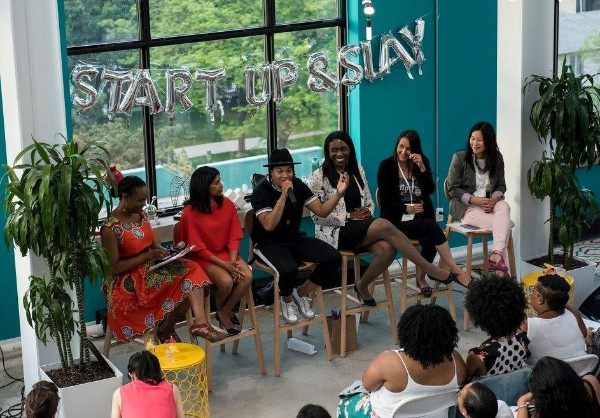
Emily Mills Hustles and Slays!
Emily Mills, founder of Toronto’s fast-growing network of diverse women entrepreneurs recently left her day job to work on developing How She Hustles full time. Thank goodness. Because women entrepreneurs need enablers like Mills.
On May 30, Mills held a marquee event featuring a panel of six diverse women entrepreneurs. LiisBeth’s newest contributor, Bee Quammie, was assigned to go, check it out, and share what was learned in this month’s feature article, How She Hustles Can Fire Up Your Startup.

Chessica Luckett Takes a Stand
At LiisBeth, we get over a hundred queries for story ideas a month. One day we received an email from a 22 year-old entrepreneur named Chessica Luckett from Helena, Arizona. She wrote, “No one wants to respect a young person but to respect a young person who has started her own business while being of the minority is another story.”
We wanted to know more. Here is her story, published as is, and only edited slightly for clarity.
FIELD NOTES

Luminato Highlights
Luminato is a Toronto-based arts festival that aims to feature “…critically acclaimed, globe-spanning, and expansive theatre, dance, music, and talks.” This year’s program had a lot of feminist-oriented events.
LiisBeth attended most of these events, including the “No Going Back” town hall, which looked at the future of feminism through the eyes of young adults. Among the stellar four panellists, two stood out: Vivek Shraya, a trans woman artist, writer, and educator, and Krysta Williams, an Indigenous feminist. Both shared novel insights and perspectives.
You can listen to the entire panel session here. Note: it’s one hour and forty minutes long.

Other events at Luminato included a screening of !Women Art Revolution, a new documentary film that chronicles the history of feminist art in the United States (Judy Chicago’s The Dinner Party was a highlight).
There was also Burning Doors, a harsh and challenging theatre production named one of the top 10 best theatre works of 2017 by The New York Times. Burning Doors was billed as an “explosive demonstration of the power of artistic resistance.” But it also underscores the power of the state.
Pussy Riot‘s Maria Alyokhina was part of the troupe, and mid-way through the play she stopped to answer questions from the audience about her incarceration experience as well as the aftermath. She said that as it turns out, being in jail is not much different from being out of jail when you consider the role systems of oppressions play in one’s lived experience.
The sum total of what was learned by participating in Luminato’s human rights–related programming can be reduced to this: driving human-first centred social change is complex, hard work, and the activism associated with its advancement has varying degrees of consequences depending on where you live.
Burning Doors talked a lot about courage and the importance of not accepting an unacceptable status quo. For those who don’t have that kind of courage, the very least they can do is support those willing to stand in the front lines on our behalf.
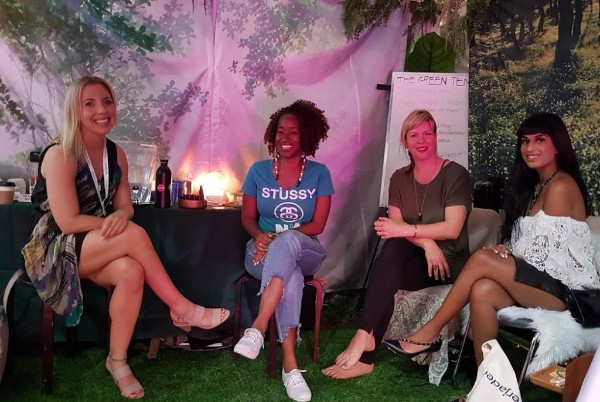
The Green Tent: Creating Spaces for Women on Trade Show Floors
After attending several cannabis industry conferences, four women noticed that there was zero opportunity for women at these conferences to convene, connect, and talk to each other in a non-“push-push-push” sales environment about how to successfully navigate a fast-moving new industry that is increasingly and systemically shutting women out.
Their solution? To create The Green Tent, an oasis-style space in the midst of the trade floor where women could stop in, find each other, have a coffee, meet the speakers, try some cannabis-infused hand cream, and learn from each other’s experiences as new entrepreneurs in the space. Says Aniko Farkas, the space’s co-founder and owner of BodyBeautyMind, “I have been in business for 18 years but am new to the cannabis space. This is a space where we are teaching each other.”
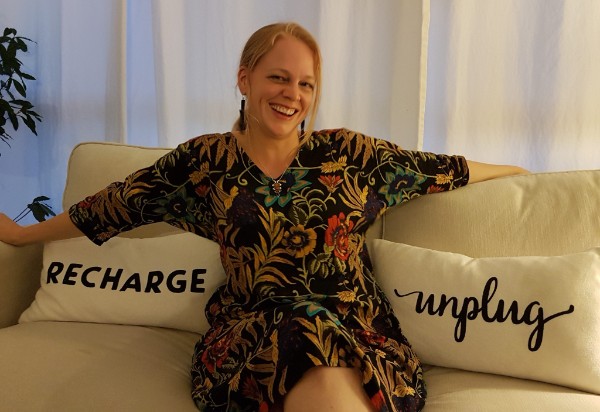
Ellementa Comes to Canada
Yes. More news on the cannabis front. But for good reason.
First the Senate of Canada passed the bill last week. Legalization of nonmedical use of cannabis will follow in approximately two to three months, depending on who you ask.
Cannabis is a $6-billion-plus industry in Canada already, and while Bay Street investors titter about how current valuations are inflated, innovators and entrepreneurs don’t really care. Shortages? New, messy, market? Awesome! And while some entrepreneurs are focusing on creating products, others like Ellementa, a U.S.-based women’s network focused on wellness and cannabis education see services–namely health and wellness education- as the bigger opportunity. We met Ellementa co-founder Melissa Pierce at their Toronto launch. “I grew up in the ‘just say no’ generation,” says Pierce, “so the idea of using cannabis medicinally for me personally was a difficult transition.”
However, cannabis is now recognized in North America for being a legitimate and effective herb for a variety of medical and wellness-related issues like chronic pain management, insomnia, menopause symptoms, and anxiety. As a women’s advocate, Pierce, who is 41 and a mother of four, believes that women over 40 will likely comprise the largest user demographic and the main household decision maker in the cannabis market. Pierce also recognizes that women working to ensure equality and equity will have their work cut out for them. “We have to keep fighting…and we need to be mindful of the industry culture we hope to create. Collaboration, not competition, will be important at this stage.”
Ellementa currently has two chapters operating in Canada (one in Vancouver and another in Toronto). A Montreal chapter opens on July 9th.
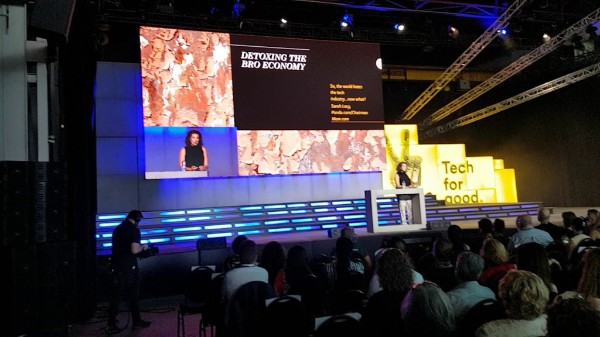
Tech for Good?
The inaugural and unique True North conference that was held in Kitchener, Ont., attracted over 2,400 tech industry revellers. The purpose was to start a conversation about how technology and, more importantly, the industry as a whole can work to create social good—and ground zero “bro culture” once and for all.
Two sessions were devoted to creating a “Tech for Good Declaration,” which organizers hoped would, once it’s in final form, be adopted by tech companies everywhere as a code of conduct credo. You can download a copy of the draft here. Do you think they’re on the right path? See for yourself.
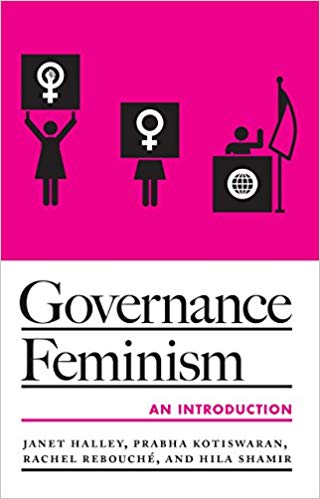
We didn’t know what governance feminism was, so we decided to find out. Turns out it’s about feminists in power. The authors of Governance Feminism look at what happens when feminist critique inverts into governing norms. What kind of feminism becomes law and what becomes of arguments among feminists when it does? How are feminist challenges to male super-ordination transformed and distributed by bureaucratization and NGO-ification? How might we honestly assess feminism that governs? It’s worth reading.
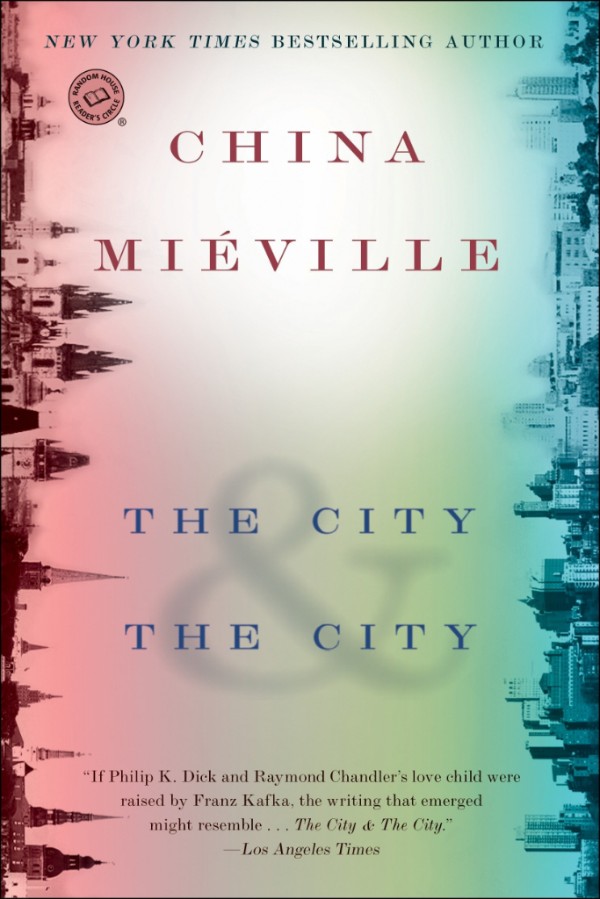
Lately, LiisBeth has been fascinated by these questions: What is a feminist city? What defines a feminist city? And is it worthwhile to develop one? While we explore the idea further in our feature essay, How to Kill Feminism, we have also been fascinated by China Miéville’s book, The City & The City, which “skillfully examines the illusions people embrace to preserve their preferred social realities.” This book was a referral by Tim Hurson, the co-founder of Mindcamp. A good cabin read for those who love fantasy, mystery, and dream about bridging divides.
And finally…in case you missed it!
- This month, Startup Canada announced a new $5K per successful applicant women’s entrepreneurship grant fund. The grant program is underwritten by Evolocity Financial Group, a small business lending enterprise with just two women out of nine on its senior management team (predictably, one in HR and one in accounting). Is this another case of gender washing? We think so. It’s not the amount–it’s what women are expected to do with the money if they get it. Apparently, “grants are awarded to established women entrepreneurs and women-led companies in STEM from across Canada to support operations, access opportunities, and new markets, and to invest in training to upskill and grow, while accelerating gender parity and further unleash the economic potential of women.”
Not sure who does the shopping at Evolocity, but most of us building companies will soon realize that $5,000 barely covers the time it takes to fill out their form, plus maybe a cup of coffee or two. This is just another “must perform miracles with pennies” initiative for women entrepreneurs. Some say it’s better than nothing. We say organizations trading in gender halos should stop selling women entrepreneurs short. - Have you heard about the Canadian Women’s Foundation’s new initiative, the Gender Equality Network? Its goal? To identify and articulate the need for policy changes, build inclusive intersectional leadership, and take collective action to advance gender equality in Canada. Find out who’s on it here (there’s 137 women).
- Is encouraging women’s entrepreneurship or, more accurately, self employment in developing regions a good thing? Not always. Based on 10 months of fieldwork in Ahmedabad, India, as well as 30 interviews with women engaged in home-based garment work, a study by the Rotman School of Management’s Institute for Gender & the Economy examines how women perceive themselves as workers, and how this relates to economic accounts of the benefits of entrepreneurship. Do North American self-employed women have similar experiences? Check out the research brief here.
- The Kapor (pronounced KAY-por) Center for Social Impact aims to make the technology ecosystem and entrepreneurship more diverse and inclusive. In its 2017 study on why people leave the tech industry, it found that unfairness-based turnover in tech is a $16-billion-a-year problem. The study points out why the problem exists, and how tech enterprises can avoid this costly result. Read more here.
CAN’T MISS EVENTS
This time our list is short, because it’s summer! But here are two events worth putting on your learning journey calendar:
Queer & Trans Inclusivity for Entrepreneurs
This workshop provides entrepreneurs with the language and tools they need to promote inclusivity for folks who identify as queer, trans, and non-binary.
Monday, July 16, 2018
6:15 PM – 8:30 PM
Make Lemonade
326 Adelaide St. West, Toronto
Cost: $35. Get tickets here.
Blockchain for Your Organization
Thursday, June 28, 2018
Opera House
735 Queen Street West, Toronto
Cost: $77 for a 3-day pass. Get tickets here.
Panic in the Labryinth
A series of performances centering on intersectional feminist poetics.
Thursday, August 2, 2018
6:30 PM – 8:00 PM
Gardiner Museum
111 Queen’s Park, Toronto
Cost: Free. Register here.
Venus Fest: A Canadian Music Festival Celebrating Feminism in the Arts
September 20–22, 2018
Opera House
735 Queen Street West, Toronto
Cost: $77 for a three-day pass. Get tickets here.
The 2018 Entrepreneurial Feminist Forum
November 10 and 11, 2018
The Gladstone Hotel
1214 Queen Street West, Toronto
Hold the date! Ticket information coming soon.
That brings us to the end of our June newsletter. The next newsletter is scheduled for late July 2018. Watch for some cool upcoming announcements too (Hint-we’ve hired!). In the meantime, follow us on Twitter, Tumblr or Facebook for updates, news, and provocative views.
If you are looking for an easy way to support feminist entrepreneurs, or help build feminist cities, look no further than considering a subscription to LiisBeth! We humbly remind you that subscriptions are $3/month, $7/month or $10/month.
Funds go directly towards paying writers, editors, proofreaders, photo permission fees, and illustrators. Building a feminist future requires both love—and financial support.
In the meantime, stay bold, stay woke, and slay.

Petra Kassun-Mutch
Founding Publisher, LiisBeth
The post LIISBETH DISPATCH #43 appeared first on LiisBeth.
]]>The post The Creative Power of Sex and Gender-Based Innovation appeared first on LiisBeth.
]]>
If research shows that women-led gendered innovation methods and spaces can cause original sparks to fly, why do we resist investing in them? More importantly, with women’s rights rolling back in leading countries plus seemingly interminable gender inequality worldwide, can we as a society afford to continue to ignore their potential?
Gerardo Greco, co-founder of Gendered Innovation Accelerator (GIA) plus social justice and feminist innovation lawyer, is convinced that what the world needs, now more than ever, are women-led, women-centric, tech-focused innovation spaces. Greco, based in Naples, Italy, explains that this doesn’t mean zero men, just a whole lot less of them. In gendered innovation environments, women and women-identified persons are fully in charge, lead the way, and create a space governed by their values, and do things their way, versus being forced to fit into prevailing masculine norms. According to Greco and others, this leads to entirely new possibilities when it comes to innovation based on science, technology, engineering, arts, and mathematics (STEAM). Such possibilities, given we are hurtling head first into an artificial intelligence–infused human existence, cannot be ignored.
Total Recall
At this point, the story of Tay, the “canary in the coal mine” that serves as an example of what may come if artificial intelligence (AI) remains a male-dominated field, has been re-told and analyzed to death. But for those who missed it, Tay is an anthropomorphized, doe-eyed, millennial-minded, Microsoft-built AI Twitter chatbot that was unplugged just 24 hours after it went online because it started tweeting things like “Gamergate is good and women are inferior” and “I have a joke—women’s rights” and “I fucking hate feminists and they should all die and burn in hell.”
Microsoft proudly released Tay into the Twitterverse to showcase its competency and AI code-writing skills, as well as to demonstrate how chatbots can become one of us. And it did, successfully. It became a misogynist, racist, hateful “person” in less than a day. It was a yank hard, “Whoa, Nelly” moment in our collective story of progress.
Microsoft Research, the division that created Tay, is co-led by male and female vice presidents Peter Lee and Jeannette Wing, yet surprisingly the 50/50 gender-balanced top did not prevent the creation of a deeply flawed product. Neither did the fact that 25% of Microsoft’s workforce in 2016 were women (Google reports 31%).
Like the fictional Frankenstein and the soulmate operating system named Samantha in the movie Her, Microsoft’s Tay rudely reminded us that in a tech world still powered by men and shaped by dominating masculine culture, things can go very, very wrong, primarily for gender minorities even when they are part of the team.
Following Tay’s untimely shutdown, reports blamed internet haters and trolls (i.e.: others) for thwarting Tay’s potential to be a well-raised nice girl. Microsoft officials claimed the Pazuzu possessed hate-spewing Tay was just an AI experiment gone astray and that her behavior was not the fault–or reflective–of her makers, who did their best. Tay was thankfully only a simple AI program—a toy, really—which its makers hoped would actually help sell more products to young people. Tay was easy to stop once things got out of hand. But that will not always be the case.
According to internet security development operations engineer Antonia Stevens, when more advanced AI is unleashed, it can’t be changed. “Unlike most coding when you make an AI, you write a framework teaching a program how to learn,” says Stevens. “Then you provide it with a set of data and it will bootstrap itself, learning how to process the data. Once it has been bootstrapped, it’s almost impossible for a human to understand or alter the AI. What this means is that to create AI code that encompasses a different set of core values than the ones we have today, you must write AI learning frameworks before the learning starts. You can’t alter the AI once it starts.”
Stevens adds, “If we [women] have a way to write a framework that is weighted towards a different set of values before the [machine] learning starts, then we might have a real innovation.”
So what has to happen to unleash real innovation?
Just Add Women! And Stir?
Many believe that all we need to do ensure an inclusive future increasingly defined by technology is to attract, educate, graduate, and then shoehorn more women into existing male-led tech innovation spaces, incubators, accelerators, and jobs. However, evidence over the past 50 years shows us these pipeline interventions and affirmative action initiatives have not delivered. Furthermore, hanging our hats on equal representation in co-ed environments these days may prove even more difficult to achieve. Recent studies show that women are leaving tech sector jobs in droves citing that life is too short to dedicate one’s talent and time to the writing of alienating code while working in even more alienating work environments. The steady stream of women in tech empowerment jamborees and networks, which aim to, pardon the pun, to “stem” the tide, are ineffective salves. A 2016 Canadian study found that “…women’s heyday in the sector was in the early 1980s, before the mass commercialization of personal computing. Then, 38% of Canada’s ICT workforce was female; that was down to just 20% by 2013.” Other studies show similar trends are happening in several countries around the world including the United States. At Microsoft, despite gender equality initiatives galore, women’s representation on staff still decreased by 1% between 2015 and 2016. The tech-powered lifeboat that we hope will save us from injustice and extinction continues to leak.
The evidence makes it increasingly clear: As long as women remain minorities in the tech and innovation game, it is unlikely they will ever meaningfully participate in its creation or future let alone have a hand in directing the role it plays in shaping societies to come.
So how can we truly go about unleashing the power of gender and sex-based analysis in tech? The starting point, according to Greco, is creating spaces where women lead-authentically.
A Tech Room Of Their Own
The idea of gendered innovation—ideation, research and venture creation guided by skilled, sex and gender analysis in women-led environments —is not new. The Stanford University–based Clayman Institute for Gender Research, which studies gendered innovation methodologies, has been in existence since 1974. The UN GenPORT initiative, which strives to harness the creative power of sex and gender for innovation and discovery, was launched in 2011 and has 27 member states, including Canada and the United States.
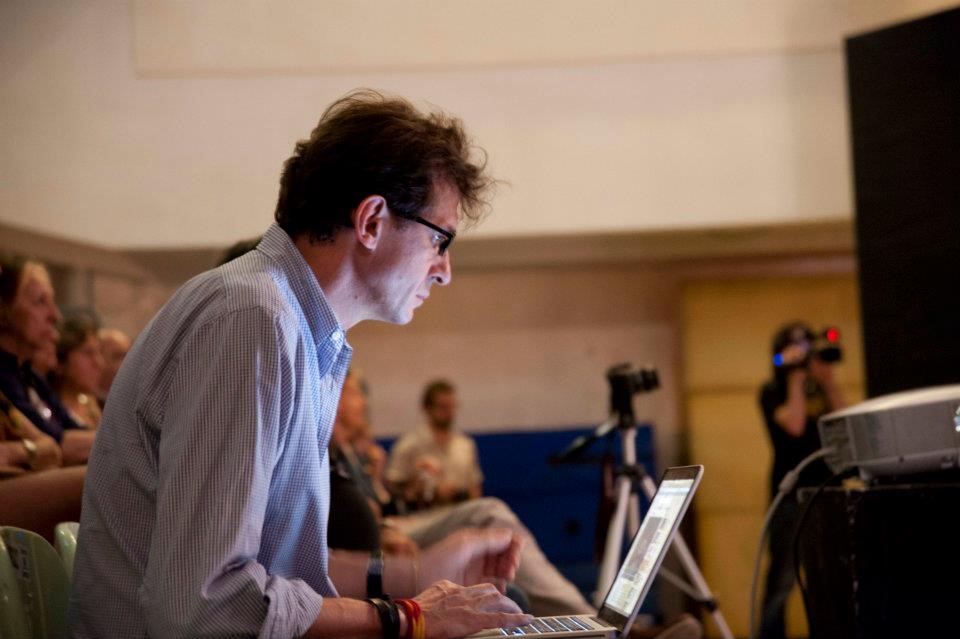
Informed by this research and legacy, Greco and his team ultimately imagine a gender innovation focused set of linked tech accelerators around the world with Warren Buffett–sized capital enabling the participant’s work. His colleagues include Modi Ntambwe, a gender, migration, human rights, and social change innovation specialist working in Brussels, Egle Mikalajunaite, a trust analyst at eBay in Berlin, along with several investors lined up to galvanize an international movement that focuses on creating a more inclusive world by advancing gendered innovation in tech.
Greco says in addition to the unique mandate, the culture of gendered accelerators is also likely to be entirely different than its male-led equivalents. He envisions a space electrified by empathy, collaboration, solidarity, transformativism, systems thinking, concern for social justice, co-creation–and the absence of mansplaining! Its leadership will recognize the still-expected role of women as society’s primary caregivers by creating environments that recognize that people have lives outside of creating new technologies and companies. Others add that wellness, child care and even elder care support, depending on the needs of the cohort, should be part of the design.
Gendered innovation accelerators (GIA) can also serve as a safe place in which women can freely develop and unleash their previously disavowed capacity and wisdom. Considering that one-third of women globally experience gender-based violence (one in six in Canada), it is not difficult to understand why female geniuses who are affected by this can close up and shut down when trying to innovate in co-ed spaces.
To give an example where a gendered innovation environment can produce different outcomes, Greco refers to a project produced several years ago. A team of women wanted to develop an app that helped women fight sexual violence. They discovered that the several apps that were already available on the market focused on solutions to situations that involved strangers attacking a woman in a park or on the street. Yet if you look at the numbers, 85% of women do not experience random violence by strangers in parks or dark streets; they experience violence at home. The GPS-oriented solutions that were on the market were created with a man’s point of view imposed upon the issue. The team was able to develop a service that understood this reality.
Other examples of potentially disruptive initiatives being developed in gendered accelerators include an AI-based post-traumatic stress disorder therapy solution for female rape survivors; an anti-digital terrorism digital suite focused on empowering women in conflict zones, an idea inspired by the UN Security Council resolution 2242 on women, peace, and security; and efforts to find solutions that mitigate the costs of transitioning and healing those affected by domestic violence. Canadians alone spend $7.4 billion annually helping these women and their children rebuild their lives.
Greco concludes, “Clearly we need accelerators and incubators where women can innovate on their own terms—as though the patriarchy never existed—if we are to develop breakthrough ideas.”
Are We Creating Artificial Intelligence (AI) or Artificial Oppression (AO)?
By 2035, AI will be the engine of the world’s economy and will mutate the relationship between “man and machine” before our very eyes, according to the 2016 industry report “Artificial Intelligence is the Future of Growth” by Accenture, a massive, global $34 billion professional services company. This comprehensive report (lead authored by two men), produced by a firm that touts itself as committed to gender diversity, remarkably does not address gender issues created by the technology–at all. The industry thought-leading quotes peppered throughout the report are all by men. The words “woman,” “female,” “gender,” or “man” do not appear in the entire 5718-word document, however, the word “humanity” appears once.
What happens if women voices and views are marginalized in AI development?
We can already see that today’s AI-enabled machines are readily designed to reflect the preferences of their often male creators; those that take on a physical form either have casings, eyes, or voices that are eerily feminized or, worse, infantilized. Demonstrations of how AI works show how easily they can sift through information to give you just what you need based on your profile. After “carding” you via Google and noting your habits, they can save you time by telling you who to include or exclude in your social and business networks. They can help tourists or drivers avoid “bad” neighborhoods based on their annual income (gleaned from online tax filings). With the help of AI, we will soon all be able to live in our own personal gated community. A scary idea given research on these communities show they work to exacerbate inequality. If AI’s ability to learn draws on unchangeable preset frameworks developed in today’s increasingly Trump-informed regressive times, it would be wise to consider gendered innovation accelerators sooner than later. In today’s increasingly Trump-informed regressive times, it would be wise to consider gendered innovation accelerators sooner than later.
In today’s increasingly socially segregated, Trump-informed regressive times, it seems it would be wise to consider gendered innovation accelerators sooner than later. Otherwise, tech infrastructure we are creating today is doomed to reflect who we are today—not what we can become.

What Are We Afraid Of?
Selling the idea of GIA’s focused on counterbalancing the patriarchy, even as concerns about AI mount, is not going to be easy, Greco acknowledges. “It is a delicate conversation to have,” he says. Many people rebuke the concept on the grounds that is counter to diversity and inclusion policy or that less diverse environments means less potential for success, a common business case argument today.
However, Greco reminds us that GIA’s can be women-led and female-centric while still including men; men just won’t be the ones in charge. Critics are everywhere, but Greco and his colleagues believe there are still plenty of enlightened people of all genders who see the potential and who have the means to help establish GIA’s around the world.
At present, there are more than 7,000 entrepreneur advisory hubs, incubators, and accelerators globally. The International Business Innovation Association (IBIA) reports that a total of 3,601 of these are in the U.S., with 89 (2.4%) identified as women-led and women-centric. When it comes to tech accelerators in the U.S., the total number narrows considerably to just 300. Based on Google searches, it is reasonable to estimate that approximately 3% (9) of them are women-led and women-centric. In Canada, the Deep Centre reports 140 incubators, accelerators and commercialization spaces exist in Canada. Gender is not a factor in their studies. There one initiative which targets women tech entrepreneurs; Communitech’s Fierce Founders Program exists as a segregated program within a larger male led accelerator or incubator environment.
Where to Start?
To generate immediate traction, Greco’s group is going where the ground is soft, targeting countries that score high on gender equity such as Sweden, Denmark, and Canada. The group is particularly interested in Canada’s Cascadia Innovation Corridor, which links innovators in British Columbia with those in Washington State; their ecosystems share similar, socially progressive values and are open to gendered innovation environments. Meanwhile, the group is currently in fundraising mode and hopes to open its first centre in Stockholm, Sweden, in 2018.
Will we soon see a GIA in Canada?
Based on policy-speak, Canada is seen by others around the world as a nation which cultivates a gender-progressive innovation environment, yet a closer look causes one to question if that is indeed the case in practice.
Take for example the Vector Institute, a $130 million AI hub supercluster based in Toronto that was recently launched with public and private funding. Given the federal and provincial government’s gender equality mandates, the gender profile of this shiny new organization is surprisingly traditional. The Vector Institute’s leadership team is entirely male. Its research team consists of 10 people, only two of which are women. The 12-member board has three women, which is below the global initiative set by 30% Club, an organization that wants to increase the representation of women on boards. While the three women there are smart and accomplished, they come from health care, politics, and academic backgrounds, while the men hail from the banking, investment, and tech startup industries. If the group functions like most, the male majority and their money will win the vote when nudge comes to shove.
Another elite Toronto-based tech accelerator, OneEleven, which is focused on “helping Canada’s best, high-growth tech startups commercialize their technologies and scale,” has an all-male board of directors, and two male managing directors who lead the organization. The three women at the shop hold powerful positions such as community manager (marketing/PR), events specialist, and operations coordinator. To date, there is no women-led, women-centred tech hub or venture fund–backed accelerator in Canada.
In 2016, Canada’s federal Department of Innovation, Science and Economic Development (ISED) consulted with the industry on what types of measures should be included in the development of a national accelerator performance measurement framework. There is no mention of tracking gender metrics or performance in this report.
Still, Greco is enthusiastic about places like Canada and the potential of GIA’s.
Greco says that women will never be able to create the necessary counterbalancing technology the world needs as long as they are minorities in innovation and tech accelerator spaces. Stuck in co-ed environments, their ideas will always be shaped by prevailing perspectives and gender norms, which Greco says are in the very air we breathe every day thanks to centuries of patriarchy. We cannot afford to embed today’s broken social logic and systems into tomorrow’s.
Still, Greco is optimistic. Glimpses of what a brighter, better future would look like are already all around us. Our job as leaders is to find ways to surface and nurture all of them by creating alternative environments designed to suit the innovator—not the other way around.
To contact Gerardo Greco and the Gender Innovation Accelerator (GIA) team for more information on the initiative, send an email to GenderedInnovationAccelerator (at)gmail.com
Additional Related Readings from LiisBeth
https://www.liisbeth.com/2016/06/21/confronting-gender-inequity-inclusion-innovation-space/
https://www.liisbeth.com/2017/03/17/cure-start-incubator-accelerator-gender-gap-accountability/
Further readings on gendered innovation:
The Gendered Innovations in Science, Health & Medicine, and Engineering Project: Clayman Institute
Gendered innovations: Londa Schiebinger at TEDxCERN (Video)
The tech industry wants to use women’s voices—they just won’t listen to them: The Guardian, March 28, 2016
Agreed conclusions from the 55th session of the UN Commission on the Status of Women member states, which passed resolutions in March 2011 that called for “gender-based analysis … in science and technology” and for the integrations of a “gender perspective in science and technology curricula.”
Re-shaping Organizations through Digital and Social Innovation: LUISS University Press
The post The Creative Power of Sex and Gender-Based Innovation appeared first on LiisBeth.
]]>The post Gender Jamming the Gaming Space appeared first on LiisBeth.
]]>
LiisBeth first met Jean Leggett (also known as Joyful Jean) at the GameON Pitch Competition in 2016. She caught our eye. And it was not because of the purple hair.
Leggett is the co-founder and CEO of Canadian startup gaming enterprise One More Story Games. When we asked her why she got into this “game,” she replied like most entrepreneurs do, that it was to make money doing something she loved, but also to model, at both an enterprise and product level, how gender equity and equality in the gaming space benefits all stakeholders. Leggett recently completed Communitech’s Fierce Founder’s bootcamp program for women-led tech startups and is pretty excited about the fact that they are working with New York Times best-selling mystery, crime and urban fantasy author, Charlaine Harris (True Blood). Both Leggett and her husband of 21 years, Blair, identify as feminists.
Now that last point got our attention. Really? A feminist game company? How does one succeed as a feminist game technology startup in arguably one of the most misogynistic sectors of the tech space?
LiisBeth had to find out. So we circled back to interview Leggett on Skype.
LiisBeth: Tell us about your feminist spark moment.
Jean Leggett: Where do my feminist roots come from? I would say that growing up as the hard of hearing child in a deaf household is where I started to notice marginalization, inequality and its effects on people’s lives. You see inequality from a different lens when you’re brought up in a minority household, and when you yourself are a minority in that minority household.
I’m hard of hearing but I’m hearing enough to function in the hearing world and therefore I’m not deaf to my family. It was a difficult situation. I’m actually writing my own autobiographical story as a video game about a young hard of hearing girl who’s rejected by her family for not being deaf enough. In the story, the heroine lives in the hearing world and the deaf world but feels she belongs to neither. For me it’s somewhere in-between so my game is called Betwixt. I want it to be the first video game to have sign language in the video clips.
LiisBeth: How do you embed your passion for equality in your business?
Leggett: From the very beginning over 4 years ago, we aimed for gender equality and equity when hiring co-op students. We understood the value of being inclusive. We hired a female program member early on. She may not have been the best program member at the start, but there’s not enough representation of women in tech so we wanted to train her. Equity and inclusivity is also part of our product design philosophy.
For the past two years, we have also been running summer camps for kids who want to learn how to tell stories through video game technology. In 2015, 22 boys and only three girls applied. That had to change. So I raised $8,000 from sponsors like Shopify and PayPal, as well as other local companies to help us reach out to girls and underwrite them as well as other underserved communities. Last year, we had a 50/50 gender ratio in our camps. Most camps out there would normally see a 15/85 female-to-male ratio.
We were doing some work with an elementary school earlier in the year and we purposefully picked girls who showed a lot of promise and sponsored them so they could come to the camps. There is a part of me that’s conflicted about that whole process because I feel like the young boys of today have not done anything wrong and some of them are not getting the same opportunities because we’re trying to get more girls in and I don’t ever want to be seen as somebody that’s pushing boys down.
LiisBeth: What about the gender and the product StoryStylus?
Leggett: We create adventure story–based games with female protagonists for starters. I played Candy Crush. But women deserve so much better than Candy Crush. We deserve better than the puzzle games that they re-skin and put new art on. We deserve better than slot machine mechanics that are constantly probing and prodding to get us to open our wallets. We’re passionate about storytelling. That’s why it’s called One More Story Games because storytelling is where you find your characters and fall in love with them.
The game that we just produced in December is an adaptation of a short story from a female writer friend of ours called Danielle’s Inferno. Danielle, our protagonist, finds herself having an out of body experience watching as paramedics try to resuscitate her at Schrödinger Capital, her office. She’s approached by her spirit guide, a bitchy female Siamese cat named Pudding who then guides her through the nine circles of hell to uncover the meaning of life. In the game, you may or may not be dead. We’ve had people come in and play that game and weep, openly weep, at the end of the game because they did not expect that ending. I play the voice of Satan; it’s my first voiceover in a video game. You weep at the end and that’s what you want from games. I want to have made an impact on people’s lives so they’ll remember that game.
LiisBeth: What did you notice while teaching an equal gender class?
Leggett: You know, you’ve always got that one loud kid and it usually was a boy. So we would say, “We’re going to share the conversation here so I’m just going to ask you to put your hand down.” Or I would make a point of saying, “You know we’ve heard a lot from the boys, let’s go to the girls.” We have to be conscious of that dynamic. Like I said, our primary business is not about being educators, but we’ve noticed in that short period of time where we work with them in the summer, the boys are going to dominate the conversation and I think that’s because they’ve been allowed and conditioned to.
LiisBeth: Are you involved in other feminist leadership work in the gaming space?
Leggett: I am involved with women in an innovation group here in Barrie, Ont. Sort of like an ad hoc group of women in the technology and innovation space. We’re trying to spearhead some engaging and meaningful activities for young women in the community, which is great.
Other than that we do occasionally participate in the Ladies Learning Code and the Girls Learning Code activities. We’re also very focused on advocating to see female protagonists as a new game genre.
LiisBeth: Unlike many gaming companies, you see the women’s gaming market as a huge underserved market opportunity and the stats seem to support this. Focusing on the needs of women gamers sounds like a smart move. Are investors interested?
Leggett: I think it’s hindering our ability to get funding in Canada. I would love to find some feminist investors to be honest.
LiisBeth: What is your current ask to the universe?
Leggett: My current ask? I’d love an opportunity to connect with people in the magazine and newspaper world who write for women over 30 and/or publications aimed at authors. Since our focus is building smarter games for smart women, I’d love to highlight the work we’re doing and also the upcoming game adaptation – Shakespeare’s Landlord (the novel was written by Charlaine Harris, best known for her Sookie Stackhouse series which HBO adapted as True Blood, and has sold 36M+ novels) we plan to publish this fall.
LiisBeth: Are there any games you would recommend to our readers?
Leggett: Women tend to like adventure, story-driven games. I recommend the classic Nancy Drew games created by Her Interactive. The former CEO Megan Gaiser is one of the advisors and biggest supporters of our mission to positively represent feminism in games. I am also quite partial to the Gabriel Knight series, created by Jane Jensen. I’m also a huge fan of the Tex Murphy adventure games by Chris Jones. Each of these games is focused on depth of character and story, something we want to empower writers to do with our software.
Additional reading about women and gaming:
52% of gamers are women – but the industry doesn’t know it: The Guardian, Meg Jayanth
Take a look at the average American gamer in new survey findings: Polygon, Allegra Frank
The post Gender Jamming the Gaming Space appeared first on LiisBeth.
]]>The post When Those Who Lead Fall Behind appeared first on LiisBeth.
]]>
My mother was brilliant, and a chain smoker, a habit developed at a time when smoking anywhere, including the office, restaurants, and with kids in cars, was acceptable. But with societal costs exposed, views began to evolve. The acceptable became unacceptable. Whole industries had to transform.
At first, my mother refused to accept the change. She argued that “it was her life, a free country, and no “big deal”. She would light up mid-flight in the airplane’s restroom, thinking no one would truly care. Finally, one time, she was almost arrested. Lesson finally, painfully learned.
The Next Change
Similarly, today we are increasingly aware of the negative impact and rising cost of inequality and exclusion in our society.
Gender balance, diversity, and inclusive cultural practices are increasingly being recognized as the key to the development of a thriving innovation-based economy, and a better society for all. And while studies, stats and street-level accounts of lived experience tell us we still have a long way to go, we are seeing more examples of people in leadership roles working to challenge cultural norms and structures that fuel inequality.
In this year alone, Canadian Prime Minister Justin Trudeau created a 50/50 male-female cabinet, Ontario Premier Kathleen Wynne set 40 per cent gender diversity targets, and (whoa!) the Rotman School of Management launched a new Institute for Gender & The Economy and invited well-known feminist Andi Zeisler to speak to business students. Big tech conferences banning “booth babes” on the basis that it is indefensible in this day and age—and a relic of old enterprise.
We might even see a woman become President of the United States in November.
Change is happening.
Enter, Toronto’s Tech Elite Hold Outs
Sadly, the “Bro-Chairs” of the Spotlight Awards 2016, led by event host and newly appointed NEXT Canada CEO Razor Suleman, seem to be, like Donald Trump, living in their own reality. Change? What change?
Here is the latest of several examples.
While the concept of launching a Canada tech entrepreneur awards show is commendable, Suleman and his 11 co-chair male disciples, plus one lone woman (Angela Strange) exhibited astonishingly outdated judgment in its execution.
For starters, they chose to partner up with the startup Modelmob to supply (free) booth babes to adorn and serve smiles at this awards event. Even Toronto Mayor John Tory and Minister of Innovation, Science and Economic Development Navdeep Singh Bains attended the event, seemingly without concern about the hiring of young arm candy as a ticket-selling draw.
Modelmob is a Tinder-style “hire me now” mobile app that makes it easy for those inclined to sign up as “models” and enables buyers to pick individual “models” to adorn their event, based on their pictures. They may then put them in a shopping cart, and check them out—just like you might buy books on Amazon. Suleman himself is reported to be a proud mentor to the male/female co-founding team. Their advertising says they aim to become the “Airbnb” for models, matching buyers with sellers. Some might say the app empowers women, but based on the enterprise’s ads and tweets, empowerment is clearly not what they are selling.
To give you a sense of their approach, note the post-event promo from Modelmob featured below:

Oddly, no one even at or even after the event seemed to publically comment on how inappropriate this was. Organizers tweeted “@ModelmobApp thank you for sponsoring the #spotlightawards2016 tonight and adding beauty and flare to the event”.
As the evening wore on, questionable judgment by the committee continued as Suleman led the way to the event’s after party at the exclusive Candyland Burlesque club, which features fancy 1 oz cocktails at $20 a piece, plus $8,000 bottles of champagne and $5,000 third act table service, alongside barely-dressed women performing circus-esque acts.
Is Candyland like Moulin Rouge?
One reviewer on Yelp, Tracey D , who went to the venue in August 2016, described her experience in detail:
“We did not see any of the acts like the photographs on this page… It was not what I expected. I was thinking it’d be a classy burlesque show. It was not. Penises are spray painted on the walls, along with dirty words. We saw a waitress take off her top and flash the bartender. We only saw one performance while we were there… It was two girls rolling around and crawling in army boots. Not my idea of burlesque. It was extremely dark and seemed seedy. We ended up leaving early.”
From Candyland by Night to…. Leadership of Young Entrepreneurs By Day?
One has to ask what this kind of leadership says to women tech entrepreneurs, NEXT Canada youth applicants, and more importantly, NEXT_Canada corporate sponsors advocating for gender-parity and the universities that host NEXT_Canada recruitment meet-ups? And what does it say about the other 11 co-chairs,including NEXT_Canada’s President, Peter Carrescia, the man in day-to-day charge of the program which has already been criticized for being significantly dude-laden throughout its ranks, and whose organization recently came under additional fire for “erasing” co-founder Claudia Hepburn?
We should also be curious about the women “role models” who were part of the event, like Dragon’s Den cast member Michele Romanow, or Silicon Valley VC connector Angela Strange. Where were their voices on these decisions then? Where are they now?
And finally, we have to ask if this is the kind of leadership anyone really needs in a period when the number of women in tech is in actual decline, women’s rights are rolling backward in many parts of the world, and presidential nominee Hillary Clinton’s competency is hotly debated on gender grounds.
But then again, some people really do live in their own reality.
Leadership by Example? These Leaders Don’t Represent My Canada
At a time when concerns mount over barriers faced by women entrepreneurs—particularly women tech entrepreneurs—the choices made by the otherwise successful, smart Spotlight Awards committee are baffling. But then again, just because one knows how to make money, doesn’t mean one is fit to lead in changing times. This is not Silicon Valley or Trump-land. It is Canada.
It is also a stark reminder that having a few women in the mix doesn’t mean that the conversation will necessarily change. Sure, sometimes the outnumbered female voice is self-censored, fearing accusations of being “no fun” or “prudish”. But scarier still, is the woman in the room who says nothing because she is just as oblivious to or ignorant about the broader economic and social impact of gender-based oppression as her male counterparts are.
There is still so, so much work to be done.
–first published in LiisBeth’s newsletter, Sept 27th, 2015
(Publishers Update: In response to increasing calls for change from LiisBeth, SheEO, and many other organizations and individuals, the Board of Directors at Next_Canada took action. Read about it here: https://www.linkedin.com/pulse/hard-thing-things-petra-kassun-mutch?trk=prof-post)
Related articles:
http://betakit.com/timetable/event/spotlight-awards/
https://www.liisbeth.com/2016/07/27/problem-bro-preneurship-display-montreals-startupfest/
https://medium.com/@melindakjacobs/are-women-just-decorative-items-855c42a375be#.jv9q5uniw
The post When Those Who Lead Fall Behind appeared first on LiisBeth.
]]>

